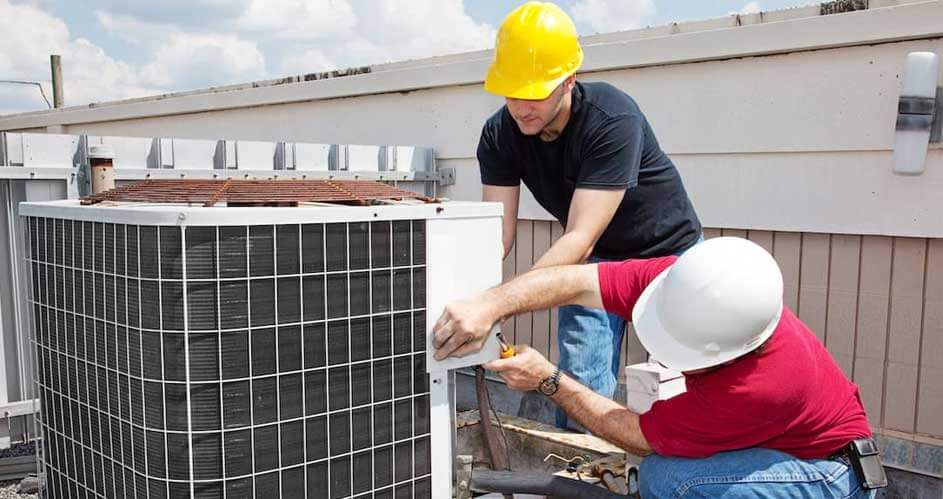
As a homeowner, keeping your living space comfortable is always a top priority. One essential component to achieve this goal is a reliable air conditioning system. However, like any household appliance, your AC unit won’t last forever, and knowing when it’s time for an upgrade can save you money and headaches in the long run.
In this blog post, we’ll delve into telltale signs that suggest it’s high time for an AC replacement.
When you need your AC replaced, it’s best to hire a professional to get the job done right. If you live in the Oklahoma City metro area and need an HVAC technician, click here.
Signs it’s time for an AC replacement
Here are the signs that you may need an AC replacement.
-
No cool air
One of the most obvious signs that your air conditioning system may need replacement is the lack of cool air coming out of your vents. This issue can be especially noticeable during sweltering summer days when you rely on your AC unit for much-needed relief from the heat.
A number of factors could contribute to this problem, such as clogged air filters, compressors that aren’t working properly, or refrigerant levels running low.
-
Strange noises or smells
If your AC unit is making strange noises or emitting unpleasant smells, it could be a sign that you need to replace it. Strange sounds like grinding, squealing, or banging noises could indicate worn-out parts or a failing compressor.
Ignoring these signs and continuing to use your malfunctioning AC can not only lead to more significant problems, but also pose health risks due to poor indoor air quality.
To avoid costly repairs and ensure your family’s safety and comfort, it’s best to have an HVAC professional inspect your system as soon as possible.
-
Frequent breakdowns
Another telltale sign that it’s time for an AC replacement is frequent breakdowns. If you find yourself calling an HVAC technician often to fix your unit, it may be more cost-effective in the long run to get a new one altogether.Frequent repairs can add up quickly and become more expensive over time.Replacing your old unit will not only save you from constant repairs but also provide better comfort and efficiency. A newer model comes with the latest technology that guarantees better cooling while consuming less energy than older models.
It’ll ensure that your home stays cool and comfortable without spending too much on maintenance or utility bills.
-
Higher energy bills
If you see that your monthly energy bills have increased suddenly, it might be time to consider an AC replacement. As air conditioning units age and become less efficient, they require more power to maintain the desired temperature.
Moreover, older systems may also lack modern features that help save electricity, such as programmable thermostats or variable speed fans. Upgrading to a newer model can not only reduce your overall expenses, but also improve AC efficiency and performance for better home comfort.
-
Leaking water
If you see water pooling around your AC unit, it could be a sign of either a refrigerant leak or a drain line that has become clogged.
A refrigerant leak can result in reduced cooling ability and higher energy bills. On the other hand, a drain line that has become clogged can lead to water damage and mold growth in your home.
In such cases, it’s best to call an experienced HVAC technician who can diagnose the issue and recommend the right course of action. They may suggest repairing the damaged part or replacing the entire unit depending on its age and condition.
-
Old age
As with any machine, an air conditioning unit has a limited lifespan. If your AC is over 15 to 20 years old, it might be time to start thinking about a replacement. Although regular maintenance can help extend the life of your system, an older AC will inevitably become less efficient and require more repairs.
In fact, newer models are often several times more energy-efficient than those made just a decade ago.
Additionally, modern units come equipped with features that may not be available in older systems, such as smart thermostats or variable-speed motors, which allow for enhanced temperature control and humidity regulation.
Conclusion
Knowing the signs of when to replace your AC unit can save you from a world of discomfort and high energy bills. Keep an eye out for no cool air, strange noises or smells, frequent breakdowns, leaking water, higher energy bills, and old age.Replacing your AC unit is important for improved efficiency and air quality as well as cost savings. When choosing a replacement unit, make sure it’s properly sized with a good energy efficiency rating and warranty and that it’s installed by professionals.